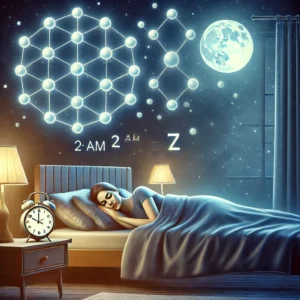
What Is Melatonin? Melatonin is a hormone primarily produced in the brain by the pineal gland. It functions as part of the body’s internal clock, also known as the circadian rhythm. The secretion of melatonin increases in the evening, signaling to the body that it is time to sleep, and decreases in the morning when exposed to daylight.
The Science Behind Melatonin and Sleep Melatonin levels begin to rise approximately two hours before bedtime, helping to lower body temperature and reduce alertness, thus preparing the body for sleep. The peak melatonin release usually occurs between 2 AM and 4 AM, after which levels gradually decline. Factors such as age, stress, exposure to blue light, and irregular sleep schedules can affect melatonin production, leading to sleep disturbances.
Effects of Melatonin Deficiency A lack of melatonin can result in:
Difficulty falling asleep
Frequent nighttime awakenings
Poor sleep quality
Daytime drowsiness and fatigue
Increased risk of insomnia
Natural Ways to Increase Melatonin Production Instead of relying solely on supplements, there are several natural methods to enhance melatonin levels:
Reduce Blue Light Exposure Before Bedtime
Blue light from smartphones, tablets, and computers inhibits melatonin production. Using blue light filters or reducing screen time at least an hour before bed can be beneficial.
Follow a Consistent Sleep Schedule
Going to bed and waking up at the same time daily helps regulate the body’s internal clock and encourages stable melatonin secretion.
Get Plenty of Sunlight During the Day
Natural daylight exposure helps maintain a healthy circadian rhythm, ensuring optimal melatonin production at night.
Eat Melatonin-Rich Foods
Certain foods naturally contain melatonin, including:
Cherries
Walnuts
Almonds
Bananas
Oats
Turkey
Create a Relaxing Bedtime Routine
Engaging in calming activities like reading, meditation, or taking a warm bath before bed can support melatonin release.
Melatonin Supplements: Are They Effective? For those struggling with severe sleep disorders, melatonin supplements are available in various forms. While studies show that they can be effective for short-term use, they should not be relied upon as a long-term solution. It is always advisable to consult a healthcare professional before taking melatonin supplements, as excessive use can disrupt the body’s natural hormone balance.
How Melatonin Differs from Other Sleep Aids Unlike prescription sleep aids, melatonin does not force the body into unconsciousness. Instead, it gently nudges the body toward sleep, making it a safer alternative for managing mild sleep disturbances. However, it is not as potent as pharmaceutical sedatives, and its effects can vary from person to person.
Potential Side Effects of Melatonin Although melatonin is generally considered safe, some individuals may experience side effects such as:
Dizziness
Headaches
Nausea
Grogginess the next morning
To minimize these risks, it is recommended to start with a low dose (0.5 mg to 3 mg) and adjust as necessary.
Conclusion Melatonin is a vital hormone that plays an essential role in sleep regulation. While supplementation can be helpful in certain cases, adopting natural strategies such as reducing blue light exposure, following a consistent sleep routine, and consuming melatonin-rich foods can significantly enhance sleep quality. By understanding how melatonin functions and taking proactive steps to maintain its balance, you can enjoy a restful and rejuvenating night’s sleep.
Image Caption: “Melatonin plays a crucial role in regulating sleep cycles, ensuring deep and restful nights. Discover natural ways to boost melatonin for better sleep.”
Internal Links:
How to Improve Sleep Hygiene Naturally
Best Foods for Better Sleep
External Links:
National Sleep Foundation – Melatonin and Sleep
Harvard Health – Blue Light and Sleep Disruption
